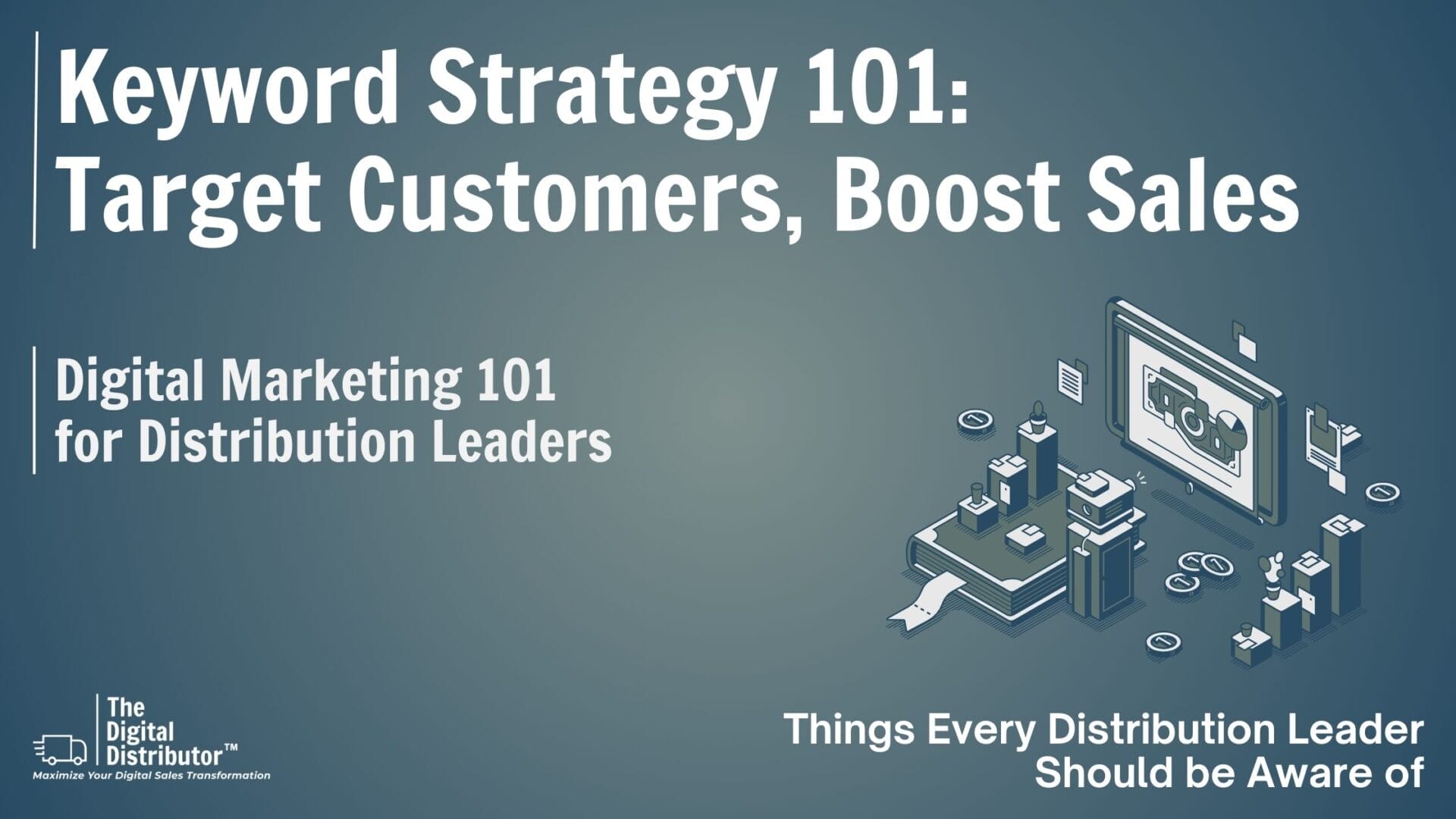Distributors and manufacturers will benefit from this “Digital Marketing 101” mini-series I put together, containing some basic elements to look for as you gauge your digital marketing capabilities. Don’t expect them all to be in place, but a small handful of any would be a great start. I hope you find the series helpful!
With over 500 million searches conducted monthly, your website’s keywords are critical to its success. But how do you know that your website uses the right keywords? The answer lies in keyword research. Before you publish a single word of content on your website, your target audience(s) must be clearly identified, along with their pain points and goals. From there, your marketing team can determine the keywords your buyers will likely use when searching for information about your specific industry or product category.
What are Keywords, and Why are They Important?
 Keywords are essential because they are the foundation of internet searches. When someone types a word or phrase into a search engine, the search engine looks at the keywords that make up that phrase and uses those words to return the most relevant results. Because of this, businesses must know what words and phrases their buyers will most likely use when searching for products or services. You will improve your chances of being found online by targeting these keywords and keyword phrases.
Keywords are essential because they are the foundation of internet searches. When someone types a word or phrase into a search engine, the search engine looks at the keywords that make up that phrase and uses those words to return the most relevant results. Because of this, businesses must know what words and phrases their buyers will most likely use when searching for products or services. You will improve your chances of being found online by targeting these keywords and keyword phrases.
Keywords are used in many different ways. For example, a phrase like “make money” can be used to search for various products and services. A person could also use a keyword like “finance” for the same product or service type. By targeting the right keywords for different products or services, businesses can improve their chances of being found online and increase website traffic.
What Words or Phrases Should You Target?
There are many considerations regarding your website’s SEO (search engine optimization). One of the most important is the selection of keywords or phrases to target. In other words, what keywords do you want to rank for on search engine results pages (SERPs)? But how do you determine which keywords to target? And once you’ve selected them, how do you incorporate them into your site’s content?
Step 1: Conducting Keyword Research
The process begins with identifying keywords and phrases your buyers search for online. Several tools accomplish this, such as Google’s AdWords Keyword Planner and SEMrush. Once you’ve identified your company’s keywords, they should be analyzed for their competitiveness to determine whether it’s worth investing resources into targeting them.
Step 2: Placing Keywords on Your Website
Where the keywords are placed on your website is just as important as choosing them.
For example, keyword phrases should be used in each web page’s title when possible and near the beginning and end of each paragraph. Keywords should also be placed in the anchor text of links on your site.
Keyword density is one of the most important aspects of search engine optimization (SEO). Keyword density is important because it lets search engines know what your page is about. Once all the keywords are placed, use a keyword density tool to determine how often keywords are used on each website page in relation to the total number of words on the page.
The following are common ways in which site owners can increase their website’s keyword density:
Add keywords to your content as you write it. Use keyword tools to help you determine how many times to use each word.
 Use keywords in your meta description. A meta description is a brief text that appears under your page title on search engine results pages. It should give searchers an idea of what your page is about.
Use keywords in your meta description. A meta description is a brief text that appears under your page title on search engine results pages. It should give searchers an idea of what your page is about.
Use keywords in the URL of your site. Including relevant keywords in your URL can signal to search engines what your website is about and improve your chances of appearing in relevant searches.
Add keywords to your alt tags. An alternative text, or “alt” text, is used within your site’s code
to provide an image’s textual equivalent.
In general, alt text will appear in place of an image that a web browser cannot display.
Add keywords to the anchor text of links on your site. Anchor text is the visible, clickable text in a hyperlink. This tactic will help search engines understand the topic of a linked page. When choosing anchor text, consider how you can help users and search engines understand the content you’re linking to.
Add keywords to your sitemap. A site map is a file on your site that lists all the pages on your website. It consists of page titles and brief descriptions. It is sometimes used to plan a website or find out what pages are on it. As such, use keyword-rich titles and descriptions when constructing your sitemap.
Step 3: Monitor Your Website’s Keyword Ranking
Tracking your keyword ranking lets you see how well your website is doing and whether any adjustments should be made. Tools like Google Search Console will reveal where your website ranks for specific keywords. A tool like SEMrush will track your organic search traffic, telling you how much traffic you get from Google search results.
Conclusion
When it comes to content, using the right keywords is essential. Keywords should be relevant to topics your buyers will likely use when searching for information online. Using the correct keywords will increase your chances of being found by potential customers and clients.
Keyword usage is crucial for increasing traffic to your website, and it’s also essential for improving your search engine ranking. The higher your ranking, the more likely buyers will find your website when searching for information related to your business or industry.
Without effective keywords in your website’s content, it will be difficult for buyers to find your company. But by understanding what keywords buyers use to find your products and services, your content will speak to their needs and drive them to your website.


